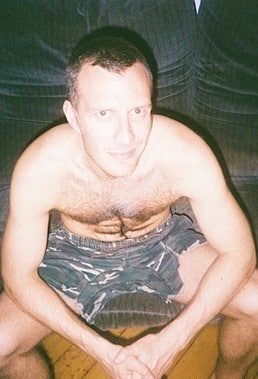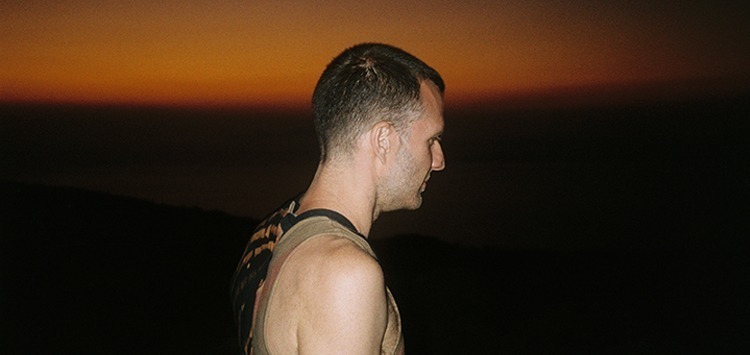"My work drives the queer agenda forward"
Christopher Ferner
Spyros Rennt has been capturing queer life in Berlin and Athens for years in his sometimes explicit photos - also for the articles in our magazine. We spoke to him about his work.
Interview: Christopher Ferner
Photographer Spyros Rennt has been capturing queer life in Berlin and Athens for around seven years now. His pictures tell of love, lust and wild party nights. In this interview, the Athens-born photographer talks about how Berlin influences his work, how the intimacy depicted in the photos comes about and what his life will look like when the party is over.
Spyros, how did you find your way into photography?
Photography was a way for me to express myself creatively. I've always felt drawn to photography and have always taken a lot of photos. When I reached a point in my life where my 9-to-5 job felt like a dead end, I started to put more energy into photography. However, there was no clear break, it was more of a smooth transition.
When did you realise that you could turn your hobby into a career?
When I published my first book "Another Excess" in 2018 - that was a turning point for me. From that point onwards, more and more people became interested in my work, the book sold quite well and my work became better known.
How did love, queerness, sex and hedonism become the main motifs of your photography?
When I started photographing, it was just my life. Back then, queerness wasn't a brand like it is today. I never actively set out to capture queer life - it happened organically. There's a lot of love in my photos, but also a lot of lust. I still like to go out partying, have fun - and then just photograph the whole thing. Sometimes the things I photograph are pretty blatant and sometimes completely banal. This juxtaposition particularly appeals to me.
Do you have an example of banal photos?
In my book "Lust Surrender", I took photos of my friends eating pizzas. The photo is banal, but there's something communal about it and I think it's also kind of sexy.
So these photos are like a window into your life?
Definitely. But of course it's just a window into a curated life. When you see my photos, you might think that I only hang out at sex parties. And of course I do like going to sex parties from time to time. But I also have phases when my life is boring and I spend a lot of time alone. My life is more varied than my photos would have you believe.
How has Berlin influenced your work?
Berlin has made me realise that I have no desire to be stuck in a white-collar job for the rest of my life. There is no other place where going out on a Sunday is celebrated like it is here. I wanted to be able to do that too - not have to think about Monday and be my own boss. And that's exactly what I've been for around seven years now. I don't lead a luxurious life in the traditional sense. But the fact that I have this freedom is a luxury for me.
How do you find the people you take photos of?
I often just take photos of my friends. I can ask them to do things that I wouldn't ask strangers to do - they love me and naturally want to support me. When I'm out and about, at a party for example, I simply approach people and ask if it's ok to take a photo of them.
How spontaneous are your photos?
I have a studio in Berlin where I take photos. But I'm better known for the photos I take spontaneously. I'm good at recognising and capturing special moments.
So do you always have a camera with you? Right now, for example?
I used to take my camera with me everywhere - back then I would have had one with me now. But that has changed now. But I often see things that I would like to photograph and then get annoyed that I don't have my camera with me.
Your photos often show very intimate moments. How do you create this intimacy?
I often don't even create these intimate spaces - they are usually already there. I merely document them.
You are your own boss, you can integrate your work into your life, you meet new people all the time - it seems like a dream job.
But of course my work can also be very stressful. You're always dependent on other people. I can't just quickly set up a still life myself. I always have to put on a smile, always remain friendly - even in situations where I don't feel like laughing. I could have saved myself a lot of stress if I had simply become a fashion photographer.
What is the best part of your job?
Of course it's nice to see your photos in a book or magazine. Getting paid isn't bad either. But I try to see the big picture in my work. I have the feeling that I'm documenting a very specific era and lifestyle with my work
So is your work political?
Certainly! We live in a time in which homophobia and trans-hostility are on the rise again.
Of course, queer life in Berlin is more normalised than in other cities. Nevertheless, we live a life on the margins of society. With my work, I push the queer agenda (laughs).
Do you ever think about what you're going to photograph when the party is over?
I don't know what I'm going to do in the future. But I've managed to build my career from nothing. That makes me optimistic about everything that may come.

Photo: Spyros Rennt

